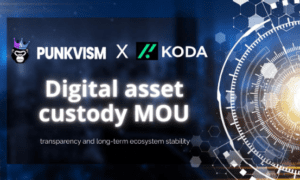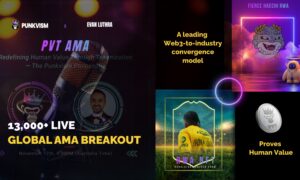Hyunki Hwang, CEO of PUNKVISM Indonesia, leads the charge in pioneering the Web 3.0 and blockchain ecosystem, driven by the mission of being “adventurers resisting an unfair society.” He is particularly known for heading the Punky Kongz NFT project, which has grown to encompass a global community of over 200,000 members.
Given that many still find blockchain, metaverse, and NFTs unfamiliar or intimidating, Hwang is committed to making these cutting-edge technologies more accessible and properly understood. We sat down with him to learn more about PUNKVISM’s vision and future plans.
“PUNKVISM” is a very unique name. What’s the meaning behind it?
The name is exactly what it sounds like: it embodies the spirit of “adventurers resisting an unfair society.” Punk symbolizes a culture of thinking and acting freely, unconstrained by tradition or authority. Activism, on the other hand, represents practical movements striving for social change.
Blockchain, metaverse, and NFT technologies break away from centralized power structures and create new value. This revolutionary nature aligns perfectly with the rebellious spirit of PUNKVISM. Through our projects and communities, we aim to help more people become part of this transformative movement.
Why Bitcoin? What problems do you see in the current financial system?
One of the biggest issues is that the U.S. dollar—the world’s reserve currency—is issued not by the U.S. government, but by a private consortium called the Federal Reserve (Fed). This group decides how much money is printed and sets interest rates, impacting the entire global economy. The 2008 financial crisis is a prime example, triggered by excessive debt, toxic real estate derivatives, and uncontrolled dollar issuance. Although private institutions caused the crash, governments bailed them out, leaving ordinary citizens to bear the cost.
If you trace the history back further, modern finance stems from Jewish bankers in the Netherlands during the maritime trade era. It evolved into a system of lending and interest, spread to England with the Bank of England, and eventually to the Fed in the U.S. By the 1970s, an agreement with Saudi Arabia mandated oil to be traded in dollars, solidifying the dollar’s position as a global reserve currency. As a result, private financial powers gained the ability to endlessly print money, creating inflation and economic bubbles—an ongoing cycle where the public suffers.
How does Bitcoin propose a different future?
In 2009, shortly after the financial crisis, an anonymous figure named Satoshi Nakamoto published an 8-page white paper introducing Bitcoin—an electronic currency system that enables peer-to-peer transactions without banks or government interference.
At its core, Bitcoin removes the power to issue currency from centralized authorities and returns it to individuals through decentralized blockchain technology. Since the system is verified by its participants, altering data is virtually impossible. This tamper-resistant, distributed ledger is Bitcoin’s key value. It offers a new path of resistance against an unfair system, where no one can arbitrarily inflate the currency or manipulate supply.
Bitcoin in 2025—how has the market changed?
I’ve followed Bitcoin since the release of its white paper in 2009, and the world has transformed dramatically since then. In the early days, many dismissed it as a scam. Today, major financial institutions and asset managers recognize Bitcoin as a legitimate “alternative asset.”
For instance, BlackRock—the world’s largest asset manager—has launched a Bitcoin ETF, making it easier for individual investors to access Bitcoin. Its capped supply of 21 million and halving cycles every four years make it a deflationary asset, fueling its long-term value potential.
Even during times of war or financial crisis, Bitcoin allows people to move assets without interference from governments or banks. It’s becoming a genuine alternative currency.
NFTs and the Future Society — Why should people care about NFTs now?
NFTs (Non-Fungible Tokens) are tokens that assign uniqueness and ownership to digital assets. Many people think of them as just “digital art,” but they offer much more. As the metaverse expands, people will own virtual land, homes, and vehicles just like in the real world. NFTs will become essential infrastructure to prove ownership and trade these assets.
PFP (Profile Picture) NFTs have already evolved into community memberships with real benefits, including games, finance, digital events, and more. Think of NFTs not just as images, but as shares in next-gen platforms that bridge the virtual and real worlds.
You often talk about humanoids, universal basic income, and social change. How do NFTs tie into that vision?
Back in 2017, Elon Musk and Sam Altman predicted that mass-produced humanoid robots would one day eliminate the need for humans to work, solving resource scarcity and enabling universal basic income.
It’s a scenario reminiscent of ancient Rome, where free bread and entertainment replaced jobs once held by slaves. People no longer worried about survival—but were left wondering about purpose and meaning.
Similarly, we may find ourselves seeking identity and fulfillment in digital spaces. With VR and satellite internet expanding, it’s expected that by 2030, 5 billion people will spend more time in the metaverse than in the real world. NFTs will be crucial in that era—empowering fair access, economic participation, and cultural creation for everyone.
What are some concrete benefits of owning an NFT?
NFT holders may receive voting rights in community decisions, profit-sharing from project success, or real-world perks like access to official merchandise and exclusive events. Owning an NFT is like investing in a platform that connects digital and physical realms.
With Punky Kongz, we’re developing real-world memberships and projects that integrate NFTs with food delivery services, cultural content, and even decentralized meme coins like PKC—all expanding the utility and value of NFTs.
What’s next for PUNKVISM?
PUNKVISM is focused on lowering the barrier to entry for Web3 technologies like blockchain, metaverse, and NFTs. We don’t just talk about theory—we let people experience NFTs through real benefits and community participation. Our philosophy remains: resist the injustice of centralized systems and explore new, decentralized alternatives.
We’re actively expanding beyond NFTs into games, education, and content, using our global community of over 200,000 as a foundation for building a real Web 3.0 ecosystem.
Final words for readers new to blockchain and NFTs?
It’s okay to find this space confusing at first—I did too. But after witnessing the 2008 crisis and reading Satoshi’s white paper, I saw the possibility for real change in how money and power are structured.
We may be on the brink of a new era—like ancient Rome before its transformation. As AI and robots take over labor, we’ll seek new life paths in digital worlds. NFTs and blockchain could be the foundations of that future economy and culture. I encourage everyone to explore, learn, and experience it firsthand. At PUNKVISM, we’ll keep pushing to share these revolutionary ideas and technologies with the world.



































